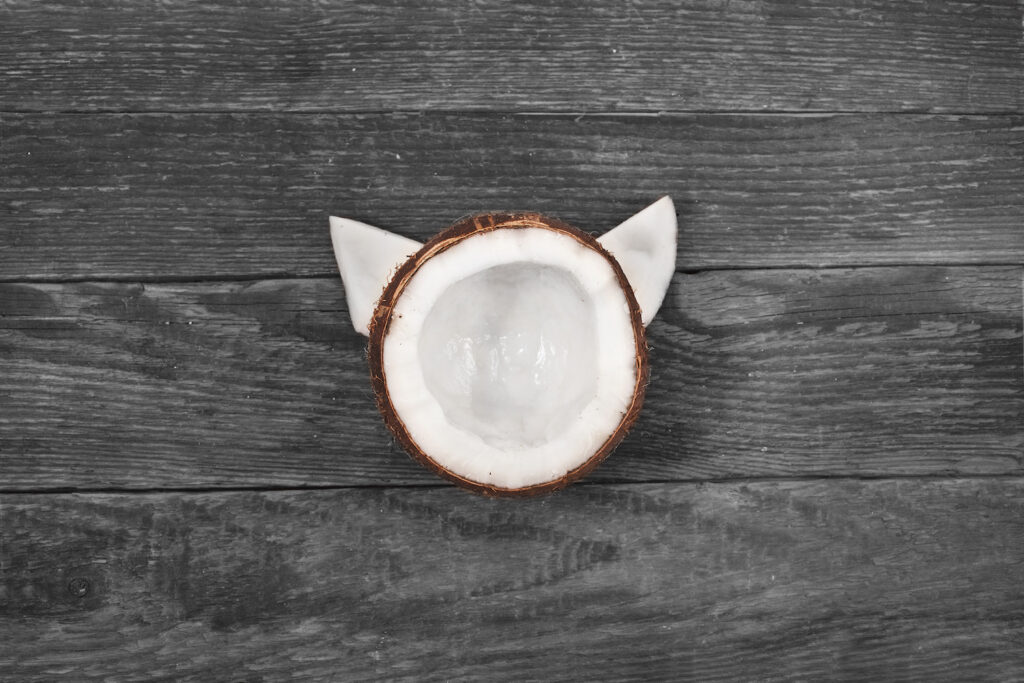The numerous benefits of coconut oil cannot be overemphasized, and the hype around it has spurred interest into this kitchen basic causing a lot of research by scientists from various disciplines. Health benefits of this oil are best obtained when it’s in its virgin state. This oil is applied topically on the skin and hair or consumed orally. Coconut oil is composed of 90% unsaturated fats with most of these being Medium Chain Triglycerides (MCTs) whose main component is lauric acid that has antibacterial, antiviral and anti-fungal properties. MCTs also contain capric and caprylic acids that also have anti-fungal effects. It also has traces of unsaturated, monounsaturated and polyunsaturated fatty acids.
The health of pets is paramount to their owners and sometimes maintaining them in good shape can prove to be an expensive affair. According to Dr. Bruce Fife a nutritionist and naturopath and author of “Coconut Therapy for Pets”, coconut oil can replace commercial pet care products effectively at a fraction of the cost. He declares that everything that coconut oil does for humans it can do for pets. A study that he conducted concluded that coconut oil provides more energy and vitality, increases metabolism, protects from illness, it also softens the skin, provides protection from pests, prevents allergies and improves digestion.

Coconut oil provides more energy and vitality for your pets
Research published in April 2014 in the Journal of Medical Mycology exhibited the effects of using essential oils in the treatment of Malassezia dermatitis. Twenty dogs were treated in this research with a blend of essential oils including; lavender (Lavandula officinalis) 1%, (Citrus aurantium) 1%, helichrysum (Helichrysum italicum var. italicum) 0.5%, marjoram (Origanum majorana) 0.5%, peppermint (Mentha piperita) 0.5%, oregano (Origanum vulgare) 0.5%. These oils were mixed into a base of coconut oil and sweet almond oil. The researchers concluded that the phytotherapeutic treatment using essential oils attained a good clinical outcome. There was no recurrence of the primary skin disorder after 180 days. The essential oil blend they tested was safe and a natural solution to a common problem, which offered an alternative to conventional pharmaceutical treatments.
Another study conducted by researchers at Tufts University concluded that coconut oil was effective in controlling the overgrowth of the fungal pathogen Candida albicans (C. albicans) in mice. This research suggests that it might be possible to use dietary approaches as a substitute for antifungal drugs to decrease the risk of infections caused by C. albicans. Coconut oil is also a rich source of medium chain triglycerides which according to Dr. Karen Becker a veterinarian and naturopath improve brain energy metabolism and reduces amyloid protein buildup that can cause brain lesions in pets.
Benefits of coconut oil for pets:
- Improves digestion and absorption of nutrients
- Aids in weight reduction increasing energy and performance of pets
- Helps prevent and manage diabetes
- Regulates insulin and promotes normal thyroid function
- Prevents and treats arthritis
- Heals and prevents irritable bowel syndrome (IBS) and colitis
- It can eliminate intestinal parasites and rid them of ticks and fleas
- Reduces or eliminates bad breath in pets
- Smoothens coats and prevents odor
- Prevents and manages conditions such as; flea allergies, itchy skin, eczema and dermatitis
- Can be applied to heal dry skin, cuts, wounds, bites and stings
- Prevents and treats yeast and fungal infections
- Prevents and clears ear infections
- Reduces allergies
- Disinfects cuts and abrasions on the skin
Read the topical treatment recipes for dogs and cats as recommended by Dr. Danna Christian here.
Works Cited:
- Carol Kumamoto et al. Manipulation of Host Diet To Reduce Gastrointestinal Colonization by the Opportunistic Pathogen Candida albicans. mSphere, November 2015 DOI:10.1128/mSphere.00020-15
- Bruce Fife. Coconut Therapy for Pets, Piccadilly Books Limited, January 2014



